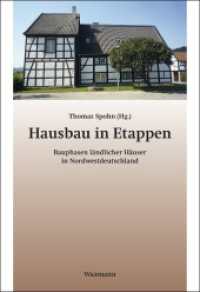- ホーム
- > 洋書
- > 英文書
- > Politics / International Relations
基本説明
New in paperback. Hardcover was published in 2009. Looking at how emergencies in the past and present have shaped the development of democracy.
Full Description
This book intervenes in contemporary debates about the threat posed to democratic life by political emergencies. Must emergency necessarily enhance and centralize top-down forms of sovereignty? Those who oppose executive branch enhancement often turn instead to law, insisting on the sovereignty of the rule of law or demanding that law rather than force be used to resolve conflicts with enemies. But are these the only options? Or are there more democratic ways to respond to invocations of emergency politics? Looking at how emergencies in the past and present have shaped the development of democracy, Bonnie Honig argues that democracies must resist emergency's pull to focus on life's necessities (food, security, and bare essentials) because these tend to privatize and isolate citizens rather than bring us together on behalf of hopeful futures. Emphasizing the connections between mere life and more life, emergence and emergency, Honig argues that emergencies call us to attend anew to a neglected paradox of democratic politics: that we need good citizens with aspirational ideals to make good politics while we need good politics to infuse citizens with idealism.
Honig takes a broad approach to emergency, considering immigration politics, new rights claims, contemporary food politics and the infrastructure of consumption, and the limits of law during the Red Scare of the early twentieth century. Taking its bearings from Moses Mendelssohn, Franz Rosenzweig, and other Jewish thinkers, this is a major contribution to modern thought about the challenges and risks of democratic orientation and action in response to emergency.
Contents
Acknowledgments xi Preface xv Introduction: Surviving 1 Chapter One: Beginnings 12 Chapter Two: Emergence 40 Chapter Three: Decision 65 Chapter Four: Orientation 87 Chapter Five: Proximity 112 Aftermath 139 Notes 143 Bibliography 181 Index 193





